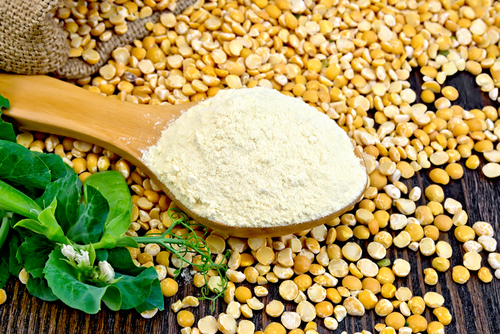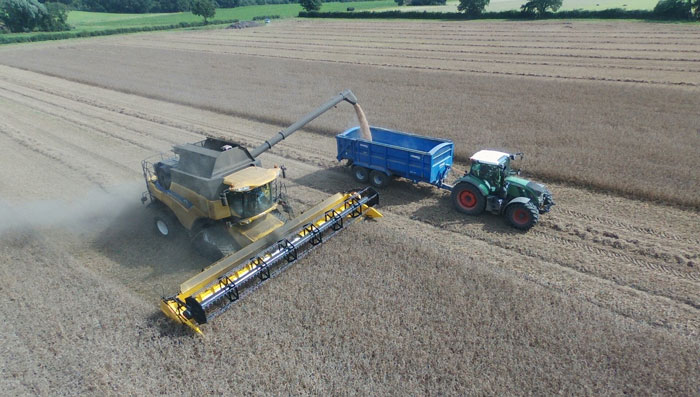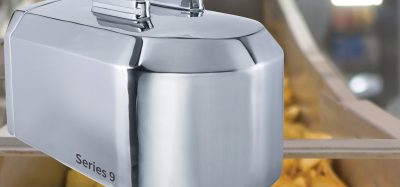A finger on the pulse
- Like
- Digg
- Del
- Tumblr
- VKontakte
- Buffer
- Love This
- Odnoklassniki
- Meneame
- Blogger
- Amazon
- Yahoo Mail
- Gmail
- AOL
- Newsvine
- HackerNews
- Evernote
- MySpace
- Mail.ru
- Viadeo
- Line
- Comments
- Yummly
- SMS
- Viber
- Telegram
- Subscribe
- Skype
- Facebook Messenger
- Kakao
- LiveJournal
- Yammer
- Edgar
- Fintel
- Mix
- Instapaper
- Copy Link
Posted: 10 September 2018 | Neil Winney | No comments yet
One UK company has developed an innovative alternative to wheat-free flour that meets the increasing demand for ‘free from’ and protein-rich foods. Neil Winney, its Managing Director, tells the story…


It was back in 2015 that a group with roots deep in East Anglia, UK, began pooling resources to come up with an innovative new product. Based at Norwich Research Park, a small group of us – having worked separately on a variety of food, farming and science projects – came together to form a new agri-based ideas business, Anglian Agri-tech Ventures. Our initial thoughts centred on the humble yellow pea, which thrives here in East Anglia. It’s versatile, naturally gluten-free and contains high levels of protein, vitamins and minerals. We believed it could be used to create a truly innovative pea flour that ticked a lot of boxes for ‘free from’ diets and optimum nutrition.
Although it had its technical challenges, we knew we were on to something. Between us, we have a wealth of entrepreneurial and scientific knowledge – I have spent much of my working life within the food processing sector, designing quick-freezing systems for fruits and vegetables, while, also within the group, Chris Harrison has a PhD in plant genetics and is an expert on peas. We therefore decided to push on with development ourselves.
Continuing and self-funding our project at Norwich Research Park, we appointed additional agri-tech and research people, allowing a period of seed and crop development and market research to take place. The work included growing a variety of pea crops under different conditions with local farming groups, to find the best-yielding, and highest-nutritional-value peas with which to create the flour.
Pea flour credentials
A source of cholesterol-lowering fibre, peas are especially good for maintaining blood sugar levels, and contain amino acids, vitamins and minerals. Moreover, they are sustainable and environmentally friendly, taking nitrogen from the air and transporting it into the soil via the plant’s root system, thus reducing the need for nitrogen fertilisers and making them an effective choice for crop rotation. Peas also have a low carbon footprint compared to animal protein and consume less water than root crops. We knew any flour we produced would be well-timed to appeal, then, not only to the gluten-free market but to those who’re environmentally aware, as well as those looking for non-animal-derived protein. The ‘free from’ market in the UK is fast approaching a value of £1 billion – and we were going to be able to tap into that market.
Further logistical, processing and packing trials took place to ensure that the crop could be handled safely and without gluten contamination, from ‘farm-to-flour’. There was another key issue that needed to be addressed: if our yellow pea flour was to be used in a range of the most delicate food products and recipes, the strong vegetal flavours that are associated with peas would need to be significantly reduced.
Through various trials, the team discovered that using a specific variety of pea and a proprietary but natural handling process significantly reduced those strong vegetal flavours. What we were left with was a ‘clean’ flavour that enables the yellow pea flour to be used in higher volumes within food applications where a more delicate and balanced flavour is required. The first commercial crop was grown in 2017 in partnership with UK seed providers and local Red Tractor-assured farm groups to ensure our peas were delivered to the highest possible quality. Our company, Novo Farina Ltd, was born along with the flour brand, novofarina.


The first commercial Novo Farina crop was grown in 2017, in partnership with UK seed providers and local Red Tractor-assured farm groups.
By early 2018, our situation regarding investors had changed completely: we’d secured significant private funding to take the business and product to the next level. A Novo Farina Product Development Centre was established in Norwich in March 2018 to produce commercial volumes of flour and further develop the product range. Other specialist resources were also added to our team: we’ve brought in agronomists to walk the fields and work closely with our growers to ensure that crops are managed and harvested to optimise yield and quality; and food technologists specialising in pulses, flours and starches, are allowing the business to develop new products.
Custom-made flours for precise needs
As our Chief Technical Officer Dr Chris Harrison explains, “We’ve recently come up with a gluten-free crumb coating system, batter mix blends and high protein and fibre flour varieties, all of which should help consumers and ingredient formulators realise the benefits of the yellow pea. Flours can also be produced to specific particle sizes and even blended with other gluten-free ingredients to deliver a custom-made pre-mixed product ‘ready to use’, alleviating the need for customers to blend and store numerous ingredients. We can make green-pea flour too, for those who may wish to benefit from the even higher fibre and protein levels, or just to benefit from the unique pale green colour that the flour brings to foods. For example, green pasta is one particular product already being made from green pea and green pea snacks are also becoming more prevalent. Through these innovations, we hope to see new products to market in sectors that aren’t limited to ‘free from’, but that also include health & fitness, healthy snacking and pet foods. We believe there is a real opportunity now for manufacturers to use novofarina flour and our derivative ingredients to differentiate and innovate.”


Its versatility makes novofarina an option for batters and crumb coatings.
“We’ve structured the business to work to internationally recognised standards and have been careful to source raw materials, equipment and services from reputable suppliers who share our values and conform to the same stringent checks that are expected within the industry. This means that the whole process from ‘Farm-to-Flour – sourcing seed from UK suppliers, growing the crop in East Anglia and processing flour and derivative products in East Anglia – is handled in a dedicated gluten-free environment and guaranteed to <5 ppm of gluten, as well as being free from the 14 major allergens and additives.”
Since Novo Farina launched in April 2017, we’ve already seen sales into the bakery and coatings sector to businesses big and small, and we continue to develop new products with several blue-chip food manufacturers as well as ingredient producers and distributors. Not only are UK customers showing an interest, no doubt attracted by the 100 per cent British ingredient claim and thus provenance assured, but export markets are looking to us as an innovative plant-based ingredient supplier to help with their NPD and protein and fibre enrichment requirements.
Explains Veronica Grube, our Head of NPD and Food Technology, “Because it’s taste-neutral and light-coloured, novofarina works well in flat breads, pizza and cakes. It also works in batters, coatings, snacks and pastas, as well as in soups, sauces and certain beverages as a thickener, so we’re seeing interest from manufacturers working in those sectors and looking for a ‘free from’ flour option. While higher than that of conventional wheat flour, our price compares favourably with those of other ‘free from’ flours. Replacement of less nutritious, more expensive imported gluten-free flours is clearly another consideration for UK manufacturers when assessing novofarina.
Proven success
Increasing interest from the food manufacturers and ingredients houses meant that in April, Novo Farina Ltd was the winner of the 2018 Ingredients Show ‘Great New Idea’ competition at the NEC Birmingham. “Not only was this a great vindication of all our hard work and belief in the business,” says Vicki Myhill, our Marketing Manager “it’s vital for credibility within the manufacturing marketplace, too.”
Beyond the production line, however, Novo Farina is also aiming to sell direct to consumers via supermarkets, health food stores, farm shops and online and, to this end, the company has taken the product out to meet the consumer. At this year’s Royal Norfolk Show, supplies of the flour sold out during the two days, and we learned a lot from having the chance to chat to home cooks who visited our stand. It was clear they were looking to fill the gap in the current market – rice, tapioca and potato flours might be functional and gluten-free but, unlike pea flour, they have little nutritional value. Best of all, visitors could actually sample novofarina in action for themselves, via the home-made waffles we offered. After all, when push comes to shove, and to ensure repeat business, it’s all about the taste.
About the author
NEIL WINNEY has a technical background in food process engineering and has spent several years leading NPD teams in fresh produce testing, specialist labelling, refrigeration and food handling systems before moving into sales, marketing and business management roles in various global reaching businesses.
Issue
Related topics
Allergens, Free From, Health & Nutrition, Ingredients, New product development (NPD), Plant based, Processing, Proteins & alternative proteins, Research & development, Technology & Innovation, The consumer
Related organisations
Anglian Agri-tech Ventures, Ingredients Show, Norwich Research Park, Novo Farina









